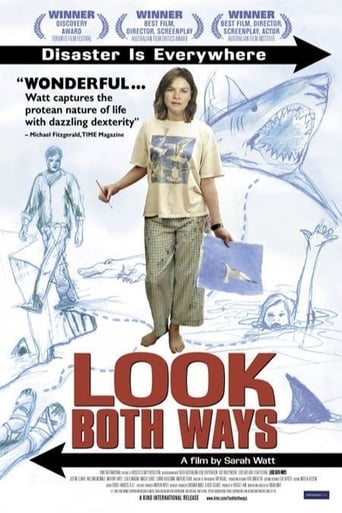Shane Carty
This is one of my favourite films, I have seen it twice. Having lived in Adelaide until I was 22 I can say it captures the city and nature of the residents in a very thoughtful and complete manner. Remarkable film in its understated style and ability to convey feeling with little effort. Is awkward at times but this tends to add to the charm, like meeting an old friend after many years. My Year Without Sex is also worth seeing, though I didn't enjoy it as much it is still a very good film. Hopefully more and more people will begin to realise that wonderful films can be made on small budgets and without resorting to masses of computer generated scenes. Maybe directors will once again trust actors to bring intelligent contributions to the film and allow them to navigate their own way through the development of a character. It seemed the actors found their own ways of playing these characters and hence they were given dimensions that are never evident in many other films.
brimon28
I had the great fortune of viewing this film and seeing a stage performance of Chekovs "Three Sisters" in the same weekend. It was the second time I had seen Look Both Ways. Once is usually enough for me to see a film, but Look Both Ways is eminently re-viewable. There is something new every time. Just as we can look at Three Sisters over and over again, Look Both Ways has the 'everybody is related" thread, as has Chekov's great drama. So Chekov has to be staged; it is "formal" drama. LBW is naturalistic, and the actors perform to style. Both scripts are about death - death past, and death to come. The Doctor in TS says "It doesn't matter". In LBW, it does matter, but it draws people together. Did anyone else notice that the condolence card the train driver delivered to the widow was writer/director Sarah Watt's work? The conversation is recorded as a quote at the top of this site. I love this film.
fwomp
Death is a touchy subject to broach regardless of the medium in which you choose to expose it. It's uncomfortable to even think about yet touches us all on many levels, and that is why LOOK BOTH WAYS succeeds.Building on death in thought-provoking, sad, and often hilarious terms, Look Both Ways binds a small Australian community together after the death of a man upon the local railroad tracks. Meryl (Justine Clarke, DANNY DECKCHAIR) witnesses the horrible event and summons the authorities. The local media shows up, including photojournalist Nick (William McInnes, IRRESISTIBLE) who's just been diagnosed with a rapidly spreading cancer. Also on the scene is Nick's newspaper partner Andy (Anthony Hayes, NED KELLY) and eventually the deceased's wife Julia (Daniella Farinacci, BROTHERS).Meryl sees the event as just another death, something that fill her thoughts and her paintings on a daily basis. Her vivid imagination surrounding death is illustrated (literally) via laughingly silly animated sequences that are sure to tickle your dark funny bone. Photojournalist Nick sees himself on the railroad tracks, having just received a medical death sentence of metastatic testicular cancer. Newspaper writer Andy battles to understand life and death while struggling to be a good father to his divorced children, and the discovery that his new girlfriend is pregnant with an unwanted child. Widow Julia tries to understand the seemingly meaninglessness of her husband's death as flowers flow into her home and she's forced to come to grips with such a sudden loss.Where Look Both Ways succeeds is in its delivery. Each person views death under their own unique umbrella, but are bound together by this one tragic event. Meryl and Nick become oddball lovers during a one night stand, while newsman Andy tries to sort through his chaotic and merciless lifestyle. Widow Julia and the engineer who was driving the train are two of the more interesting cases within the story, as they have no speaking parts until the very end, but are given ample screen time which speaks volumes on its own.The message of the flick is simple but not forced: look at death both ways. See it as a necessity but don't dwell on it. There is hope and fear within it, operating not at opposite ends of the spectrum, but as a gauge on how to live life without death looming ever present on one's mind.Meryl, the one who the film is mostly about, learns this lesson the hard way, coming to terms with her own fate, and that of Nick who's cancerous life is destined to plow into hers with the force of a padded sledgehammer.
jim-371
I concur with Mia-38's comment. This is an absorbing film, tastefully executed and rewarding to watch. Death is a daily topic in all media, part of which is shown in the film by the short animated sequences. This film takes us to what happens in our lives before that final event, death. One question raised is whether a particular death is accidental or possibly suicide. It has often been said that movies are a reactive medium. This film is sparse in dialog and much is told through expressions of some really fine acting. I believe this film will become a classic with time and be honored by many critics who on review will begin to appreciate the finesse and delicate technique of its creator. Please see this film and in so doing you will support a courageous distributor and a talented movie maker. Jim


